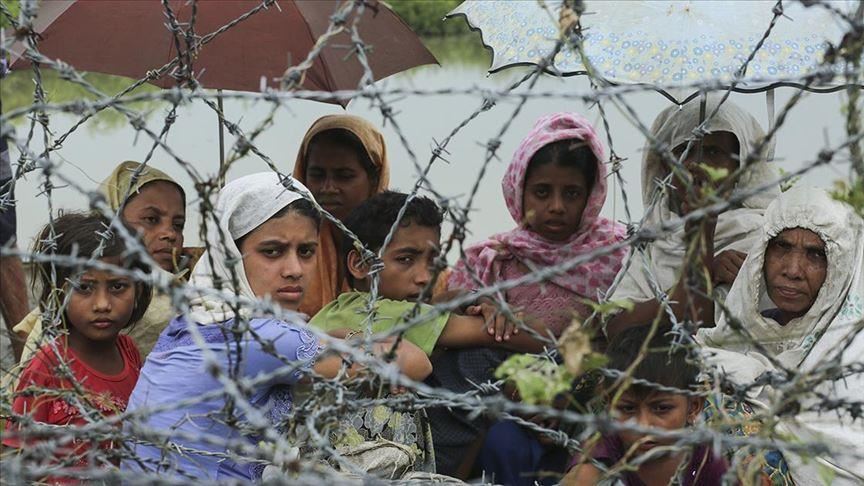COVID-19 cases spark concern in Rohingya refugee camps
Authorities put camps under lockdown but failed to provide adequate food, masks, hand sanitizers, says head of NGO

YANGON, Myanmar
Rakhine state, a conflict-torn region in western Myanmar, finally reported the presence of COVID-19 as the country recorded nearly 200 cases late this week.
Two men in Rakhine, who recently returned from Malaysia, tested positive for coronavirus, raising concerns about the possible spread of the virus in overcrowded camps across the region.
“Now we have two patients, and imagine the situation in overcrowded camps once a refugee gets infected,” said San Kyaw Hla, who chairs the Rakhine regional parliament.
“Sittwe, [capital of Rakhine] has overcrowded camps, but IDPs [internally displaced persons] still don’t have a chance to adopt protective measures,” he told Anadolu Agency.
“This virus is indiscriminate. It won’t spare anyone, regardless of race and religion.”
According to the UN Office for the Coordination of Humanitarian Affairs this February, Sittwe housed 103,557 out of 130,886 Rohingya Muslims, who were displaced by communal violence in mid-2012, in 16 makeshift camps.
More than 700 ethnic Rakhine recently arrived in Sittwe as they fled fighting between the Myanmar military and the Arakan Army, a mainly Buddhist group that claims to fight for the rights of ethnic Rakhine.
Ongoing and escalating fighting displaced more than 164,221 civilians, mostly ethnic Buddhists, in 10 townships in Rakhine state since January 2019, according to the Rakhine Ethnic Congress (REC), a local non-profit.
“There were only around 30,000 displaced people last April, and now the number exceeds 160,000,” said REC Secretary Zaw Zaw Tun.
“People are fleeing their homes to escape the fighting that is happening on a daily basis,” he told Anadolu Agency.
‘Too preoccupied to care about virus’
Of the newly displaced people, 101,670 have sought shelter in Buddhist monastery compounds and in homes of friends and relatives or unrecognized camps, said Zaw Tun.
“These people are not in a position to give a [expletive] about the virus. They are struggling for their survival,” he said.
Authorities put IDP camps under lockdown as a preventive measure, but Zaw Tun said the government failed to provide enough food and preventative equipment such as masks and hand sanitizers.
“So they are now totally reliant on individual donors and non-governmental organizations,” he said.
IDPs in Rakhine and neighboring Chin state are considered at particularly high risk of COVID-19 for a number of reasons, including active conflict and travel restrictions.
More than 8,000 civilians, mostly ethnic Chin Christians, fled fighting in recent months between the military and the Arakan Army group in the Paletwa and Matupi townships which border Rakhine.
The military excluded the Rakhine and Chin states – where the Arakan Army operates – from the list of regions it will halt offensives against ethnic rebel groups under a nearly four-month unilateral cease-fire that began in late April.
Lack of resources
“So the fighting is continuing and more IDPs are arriving Paletwa,” Soe Htet, minister and spokesperson of Chin state government, told Anadolu Agency, adding that displaced persons currently seek refuge at churches and schools.
“We are planning to build IDP camps to help ease the overcrowding at churches and schools,” he said.
He claimed the regional government is doing its best to prevent the virus spreading in makeshift camps, but admitted it was not enough due to a lack of resources and budget.
“The monsoon is arriving soon, so we need to finish camps first. We need a helping hand from every possible donor and organization to help IDPs,” he said.
Other ethnic areas such as northern Kachin state and northeastern Shan state have seen a comparatively stable situation as ethnic rebel groups have been focusing attention on confronting the threat posed by the virus while the military halted an offensive under the unilateral cease-fire.
Ethnic rebel groups, in some cases, joined with the military in responding to COVID-19.
The Myanmar government also announced on April 5 that it allocated $1.7 million (2.4 billion Myanmar kyats) to carry out preventive measures for 184,333 IDPs in 128 camps in 24 townships in the Kachin, Kayin, Shan and Rakhine states.
But groups assisting those in the camps in ethnic areas echoed concerns about the vulnerability of IDP populations, citing insufficient food and equipment supply.
“The government ignores calls to protect IDPs during the pandemic,” said a coordinator of a network helping IDPs in ethnic areas.
“There are not even enough places where they can sleep without getting wet during the rainy season,” according to the coordinator.
Anadolu Agency website contains only a portion of the news stories offered to subscribers in the AA News Broadcasting System (HAS), and in summarized form. Please contact us for subscription options.







